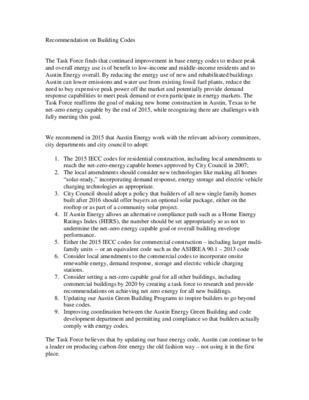Item 4c-Recommendation on Building Codes_Cyrus Reed — original pdf
Backup

Recommendation on Building Codes The Task Force finds that continued improvement in base energy codes to reduce peak and overall energy use is of benefit to low-income and middle-income residents and to Austin Energy overall. By reducing the energy use of new and rehabilitated buildings Austin can lower emissions and water use from existing fossil fuel plants, reduce the need to buy expensive peak power off the market and potentially provide demand response capabilities to meet peak demand or even participate in energy markets. The Task Force reaffirms the goal of making new home construction in Austin, Texas to be net-zero energy capable by the end of 2015, while recognizing there are challenges with fully meeting this goal. We recommend in 2015 that Austin Energy work with the relevant advisory committees, city departments and city council to adopt: 1. The 2015 IECC codes for residential construction, including local amendments to reach the net-zero-energy capable homes approved by City Council in 2007; 2. The local amendments should consider new technologies like making all homes “solar-ready,” incorporating demand response, energy storage and electric vehicle charging technologies as appropriate. 3. City Council should adopt a policy that builders of all new single family homes built after 2016 should offer buyers an optional solar package, either on the rooftop or as part of a community solar project. 4. If Austin Energy allows an alternative compliance path such as a Home Energy Ratings Index (HERS), the number should be set appropriately so as not to undermine the net-zero energy capable goal or overall building envelope performance. 5. Either the 2015 IECC codes for commercial construction – including larger multi-family units -- or an equivalent code such as the ASHREA 90.1 – 2013 code 6. Consider local amendments to the commercial codes to incorporate onsite renewable energy, demand response, storage and electric vehicle charging stations. 7. Consider setting a net-zero capable goal for all other buildings, including commercial buildings by 2020 by creating a task force to research and provide recommendations on achieving net zero energy for all new buildings. 8. Updating our Austin Green Building Programs to inspire builders to go beyond base codes. 9. Improving coordination between the Austin Energy Green Building and code development department and permitting and compliance so that builders actually comply with energy codes. The Task Force believes that by updating our base energy code, Austin can continue to be a leader on producing carbon-free energy the old fashion way – not using it in the first place.